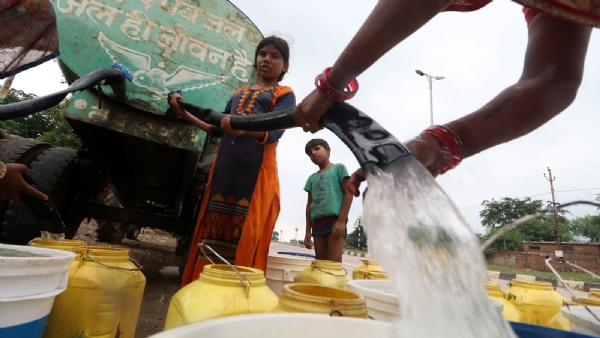Water Crisis grips Bengaluru: City struggles for drop of water as Cong govt takes control of all private tankers
This Bengaluru crisis didn"t erupt overnight; it"s a culmination of years of mismanagement and neglect. Since the Congress government took control of water tankers, prices have skyrocketed, exacerbating the situation. Groundwater levels have plummeted, leading to the drying up of numerous borewells across the city.
Total Views |
Bengaluru, often touted as India's Silicon Valley, has now finds itself in the grip of a profound water crisis, sending shockwaves across the city. Even the high-profile residences of Karnataka Chief Minister Siddaramaiah and Deputy CM DK Shivakumar are not immune, as their borewell has run dry.
This crisis didn't erupt overnight; it's a culmination of years of mismanagement and neglect. Since the Congress government took control of water tankers, prices have skyrocketed, exacerbating the situation. Groundwater levels have plummeted, leading to the drying up of numerous borewells across the city.

Resident welfare associations have taken drastic measures, rationing water and imposing bans on activities like vehicle washing and swimming pool usage. Some have even urged residents to use disposable cutlery and wet wipes to conserve water.
The price of a water tanker, which once stood at ₹500, has surged to ₹1,500-₹2,000, signaling a dire situation even before the onset of summer. Access to water is slipping away from the common man's grasp, underscoring the broader challenges facing Indian cities.
Politicians, bureaucrats, and civic authorities, in collusion with the Builder Mafia and Land Mafia, have played a significant role in exacerbating the crisis. Their actions have paved the way for a day when water scarcity becomes a harsh reality for many.
The Deputy CM has pledged to secure an ample water supply for Bengaluru “at any expense” and has assured that prices for water tankers will be standardized. With groundwater levels depleting and over 3,000 borewells drying up, the situation is particularly dire in East Bengaluru. Residential communities have been urged to exercise caution in their water usage.
#bengaluruwatercrisis
— Anagha | ಅನಘ (@AnaghaDeshpand6) February 27, 2024
Scenes at RR Nagar, one of the most hit areas in Bengaluru city which is grappling with severe water crisis.#bwssb has started supplying free drinking water since last three days.@chairmanbwssb pic.twitter.com/261UfAeFTs
Earlier on 2nd March, deputy chief minister DK Shivakumar had posted from his X handle, “Taking into consideration the importance of meeting drinking water demands in Bengaluru, our govt has decided to take over water supply tankers. This step will ensure that no water trafficking ensues in such critical times and that every household gets a water supply. Therefore, all tube wells supplying water through tankers must register themselves with the govt by 7th March on the website. Also to adequately manage water supplies, daily meetings are being held by BWSSB and Corporation officials, and a meeting is scheduled for 4th March to discuss further on the issue.”
The Karnataka government seized upon this crisis to direct criticism towards the Center, citing its failure to approve the Mekedatu reservoir project.
To tackle drinking water concerns, a grant of Rs 10 crore is proposed for each Assembly constituency in Bengaluru. DK Shivakumar said, “We had initiated the Mekedatu project with the very intention of securing water supply for Bengaluru. Despite our putting pressure on the Centre to approve the Mekedatu project with our padayatra, the Centre has not approved it. The Centre should at least approve the project at least now given the severity of the crisis.”
Severe water crisis in Bengaluru 😵
— Shashank Shekhar Jha (@shashank_ssj) March 4, 2024
Troll minister @PriyankKharge must get this fact-checked from his Islamist chief. pic.twitter.com/AxB3DoNL1P
He added, “Some of the tankers are supplying water for RS 600 while some others are charging up to Rs 3,000. To standardise the pricing, we have asked all the water tankers to register with the authorities. Prices will be fixed based on the distance travelled by the tankers.”
Notably, for the past few weeks, Bengaluru has been experiencing a severe water crisis this year, months before peak summer, causing many residents of “India’s Silicon Valley” to ration their water consumption and pay nearly double the regular price to satisfy their daily water demands. Weak southwest monsoon rains have impacted groundwater levels and reduced water levels in the Cauvery River basin reservoirs that supply the southern Indian city, which is home to over 14 million people and thousands of IT enterprises and start-ups, according to a report.
This is causing city residents to pay rising water tanker costs even before the peak summer season begins. Water tanker merchants also in some sections of Bengaluru are now asking up to 2,000 rupees ($24.11) for a 12,000-litre tanker, up from 1,200 rupees ($14.47) a month ago.
.
.

